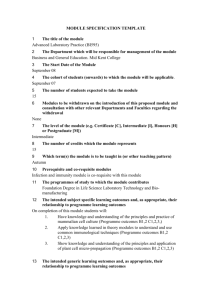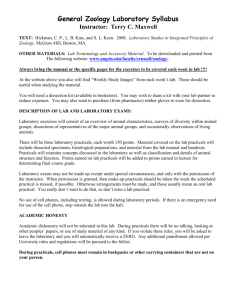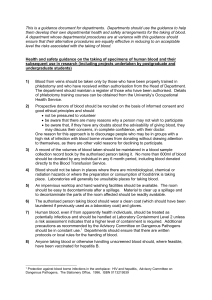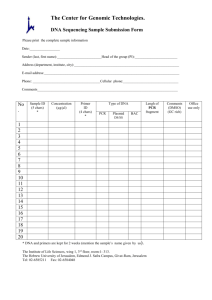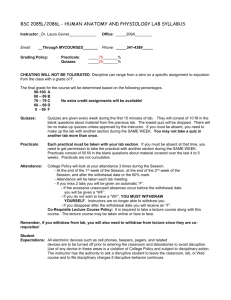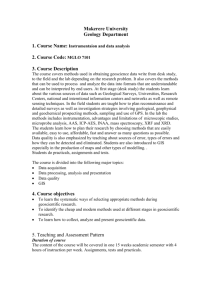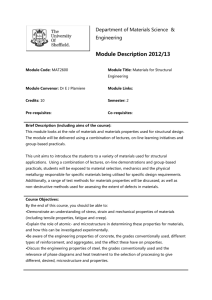clinical research methods course 2010: a primer
advertisement
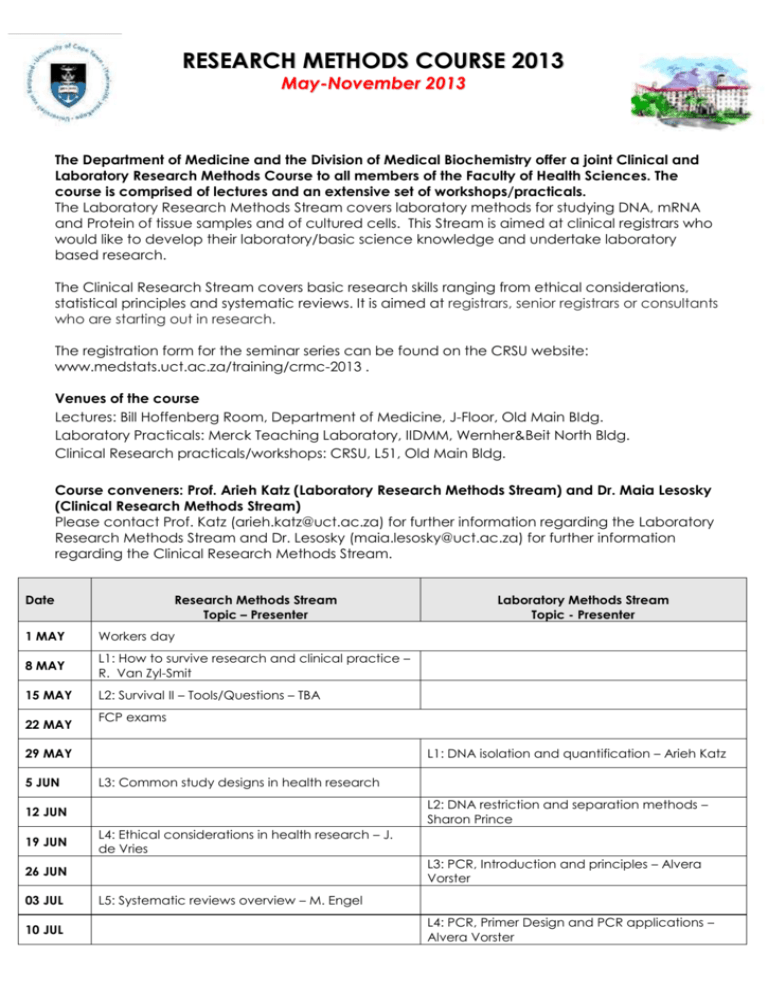
RESEARCH METHODS COURSE 2013 May-November 2013 The Department of Medicine and the Division of Medical Biochemistry offer a joint Clinical and Laboratory Research Methods Course to all members of the Faculty of Health Sciences. The course is comprised of lectures and an extensive set of workshops/practicals. The Laboratory Research Methods Stream covers laboratory methods for studying DNA, mRNA and Protein of tissue samples and of cultured cells. This Stream is aimed at clinical registrars who would like to develop their laboratory/basic science knowledge and undertake laboratory based research. The Clinical Research Stream covers basic research skills ranging from ethical considerations, statistical principles and systematic reviews. It is aimed at registrars, senior registrars or consultants who are starting out in research. The registration form for the seminar series can be found on the CRSU website: www.medstats.uct.ac.za/training/crmc-2013 . Venues of the course Lectures: Bill Hoffenberg Room, Department of Medicine, J-Floor, Old Main BIdg. Laboratory Practicals: Merck Teaching Laboratory, IIDMM, Wernher&Beit North Bldg. Clinical Research practicals/workshops: CRSU, L51, Old Main Bldg. Course conveners: Prof. Arieh Katz (Laboratory Research Methods Stream) and Dr. Maia Lesosky (Clinical Research Methods Stream) Please contact Prof. Katz (arieh.katz@uct.ac.za) for further information regarding the Laboratory Research Methods Stream and Dr. Lesosky (maia.lesosky@uct.ac.za) for further information regarding the Clinical Research Methods Stream. Date Research Methods Stream Topic – Presenter 1 MAY Workers day 8 MAY L1: How to survive research and clinical practice – R. Van Zyl-Smit 15 MAY L2: Survival II – Tools/Questions – TBA 22 MAY FCP exams 29 MAY 5 JUN L1: DNA isolation and quantification – Arieh Katz L3: Common study designs in health research L2: DNA restriction and separation methods – Sharon Prince 12 JUN 19 JUN L4: Ethical considerations in health research – J. de Vries L3: PCR, Introduction and principles – Alvera Vorster 26 JUN 03 JUL 10 JUL Laboratory Methods Stream Topic - Presenter L5: Systematic reviews overview – M. Engel L4: PCR, Primer Design and PCR applications – Alvera Vorster 17 JUL L6: Avoiding error and bias in clinical research – K. Dheda 24 JUL 31 JUL L5: DNA Sequencing – Alvera Vorster L7: Sample size and implications for power/statistical significance – L. Myer 07 AUG L6: Determination of mRNA expression – Sharon Prince 14 AUG L7: DNA vectors and cloning – Arieh Katz 21 AUG FCP exams 28 AUG FCP exams 04 SEP L8: Very basic statistical theory – M. Lesosky L8: Expression and studying of genes in cells and bacteria – Ed Sturrock 11 SEP 18 SEP L9: Guidelines for collecting and managing research data – L. Workman L9: Protein extraction, quantification and analyses methods – Ed Sturrock 25 SEP 02 OCT L10: Understanding statistics in the literature – M. Lesosky L10: Protein chromatography methods – Brandon Weber 09 OCT 16 OCT FCP exams 23 OCT L11: Developing a statistical analysis plan – M. Lesosky L11: Introduction to Light, fluorescent confocal and electron microscopy – Dirk Lang 30 OCT 06 NOV L12: Diagnostic tests, Se, Sp, PPV, NPV - TBA 13 NOV 20 NOV L12: Introduction to microarrays/proteomics – Jonathan Blackburn L13: Modern Omics: A perspective from a South African Research Platform – Centre for Proteomics and Genomics Research CDP points: 1 CPD point per 1 lecture (including 1 ethics point). Certificate of attendance: submitting a proposal, at least 50% attendance and completed course evaluation form. Last date for registration: 8 May 2012. Details of practicals on the following page. Clinical Research Methods Practicals Class size for the practical will be limited, students do not need to take all practicals as they are intended to be self-contained modules. These will be intensive workshops requiring time and effort both in and out of class. There will be prerequisites for registration into the practical, but at a minimum will require a supervisor approved thesis topic. Practicals will be scheduled after registration, but generally will be 2 sessions at 1.5 hours each. P1: Common study designs for health research - Students will study common designs in health care research then choose and develop an appropriate design for their research question P2: Systematic reviews - Develop and submit systematic review protocol P3: Power and sample size calculations for common study designs - Perform power and sample size calculations for an approved study design P4: Managing research data - Prepare database templates, codebook and data management checklist P5: Developing a statistical analysis plan - Develop statistical analysis plan for proposal P6: Ethics – 2 sessions of 1.5 hours each - Develop consent/assent forms, prepare documents for submission to ethics Laboratory Research Methods Stream Practicals: Students taking this stream do not need to take all practicals and will be allowed to take only specific practicals. The practicals will generally run on certain Wednesdays and Fridays in the afternoons. Times to be determined in consultation with students interested in the practical, however, practicals that will have less than 4 registered students will be withdrawn. P1: introduction to Laboratory research: 2 sessions of 1.5-2 hours each. First session will cover laboratory safety and concepts and calculations of preparation of solution. Second session students will prepare solutions. P2: Isolation of Genomic DNA from saliva: 3 sessions of 1.5-2 hours each in which each student will isolate their own DNA from Saliva. Quantify and run the DNA on an agarose gel and thereafter, restriction enzyme digest the DNA and run it on agarose gel. P3: PCR of VKORC1 (Vitamin K epoxide reductase complex subunit 1) gene. 2 sessions of 2hr each, in which students will PCR the VKORC1 gene of their own genomic DNA isolated in P2 and thereafter, determine their haplotype. P4: Real time RT-PCR. 1 session of 1.5h of a demonstration of Real time RT-PCR. P5: Expression of ACE. 3 sessions of 2h each in which students will express, purify, assay and perform a SDSPAGE and Western using ACE as a model. P6: Tissue staining methods. 1 session of 2h that cover principles and demonstration. P7: immunological Methods: ELISA, RIA, Ellispot and FACS. 1 session of 2h that covers principles. P8: Tour of the Centre for Proteomics and Genomics (CPGR). 1 session of 1.5-2h.
